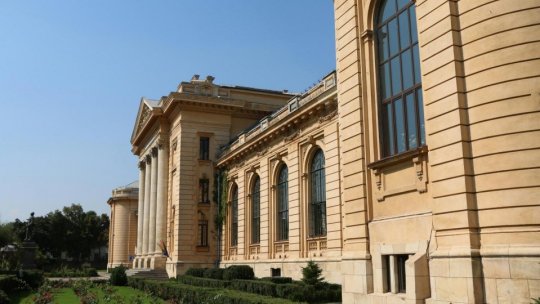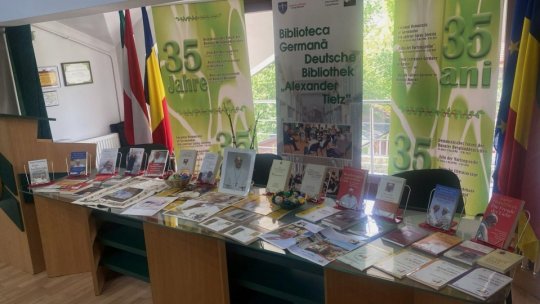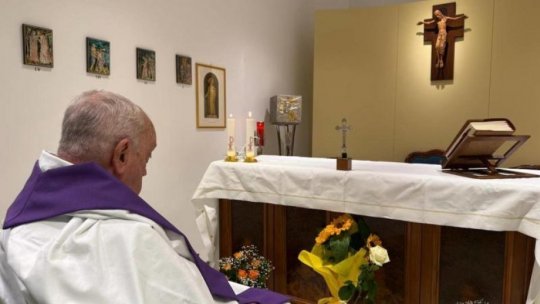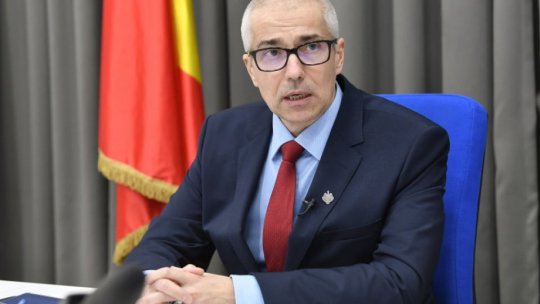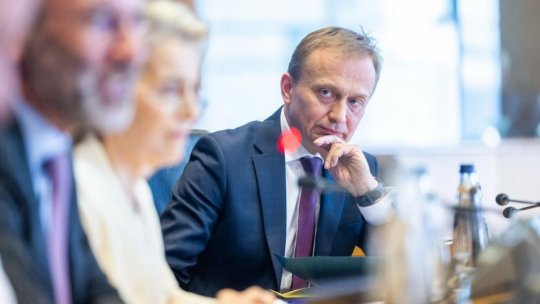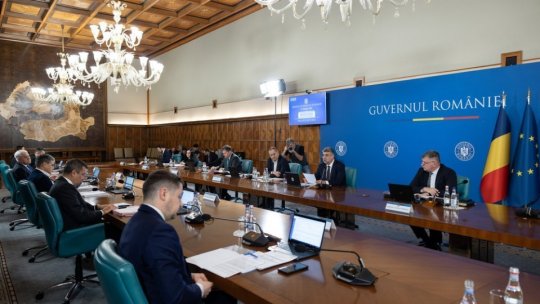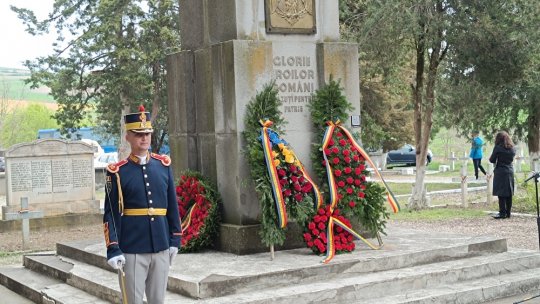US Assistant Secretary A.Wess Mitchell at the University of Bucharest
Full speech by Assistant Secretary of State for Europe and Eurasia, A.Wess Mitchell, at the University of Bucharest.
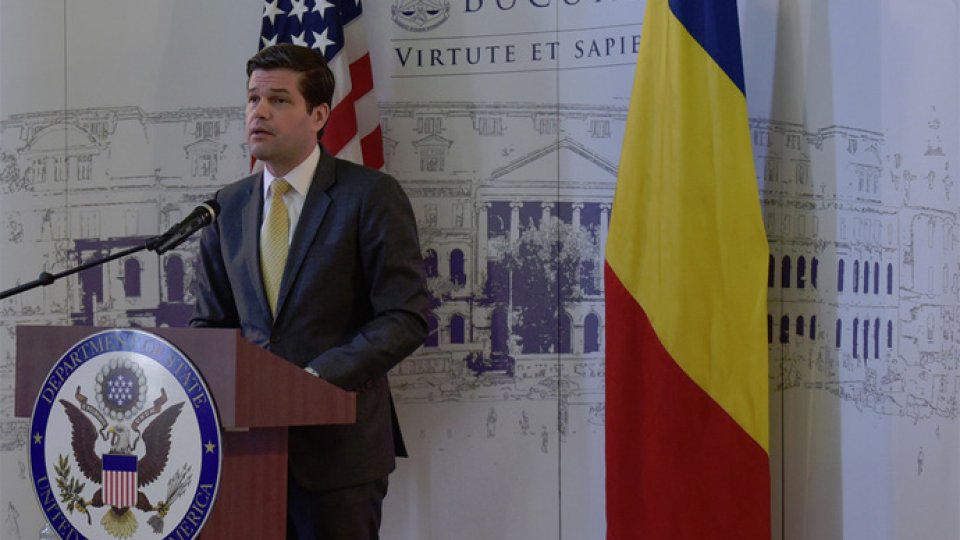
18 Iunie 2018, 19:30
United States Assistant Secretary of State for European and Eurasian Affairs, A. Wess Mitchell has been in Bucharest on June 18 to meet with senior officials and independent analysts to discuss regional security and economic cooperation. Assistant Mitchell has led the U.S. delegation to the sixth U.S.-Romania Strategic Partnership Dialogue and has also delivered a speech at the University of Bucharest.
Full speech by Assistant Secretary of State for Europe and Eurasia, A.Wess Mitchell, at the University of Bucharest. The speech was offered for publication by the US Embassy in Bucharest.
“Thank you for that very kind introduction Rector Dumitru. I was just saying a moment ago to the Rector that I spoke at this university here a few years ago and the crowd then was a lot smaller than it is now. I have absolutely no idea why that is and I am very happy that you all turned out to hear me, and want to express my gratitude to the university for the hospitality of having me here to speak today. And I want to thank all of you for turning out. I also want recognize and thank Ambassador Hans Klemm and the really superlative team that he has at our Embassy here in Romania and the great job that they are doing in an important country at an important time. I would also like to say how good it is to see some friendly faces in the audience. Some of you may know that Romania is a country that holds my very special affection and over the time of the years I have built a lot of friendships in Romania and it is good to see several faces in the audience that are friends, friendships that I have built over the years.
Romania is a very close ally and strategic partner of the United States. Romanian soldiers have served alongside U.S. soldiers in Iraq and Afghanistan, and I know the very high regard our military holds the Romanian military. On behalf of the American people, I want to thank the Romanian people for the sacrifices that they have made in supporting so many of these important missions. In particular, I would like to offer my gratitude to the families of the eight Romanian soldiers who were wounded in Kandahar earlier this spring.
Tomorrow we will hold a meeting of the U.S.-Romania Strategic Dialogue. We will discuss the ongoing, and very robust, cooperation that exists between the United States and Romania in the fields of security, energy and commerce. And we will look for ways to expand on that cooperation in the days ahead.
It is an auspicious time for us to be holding this dialogue. This year is the 100th anniversary of the creation of what we know today as Romania. It was a hundred years ago in the city of Alba Iulia that three regions came together to form a new nation-state that would become modern Romania. The United States played a very significant role in that event. We were among the first countries to establish formal relations with Romania in 1880. And after World War I, it was the United States, probably more than any other power, which worked to ensure the establishment of an independent Romania. Liberty was written into Romania’s fabric from the very beginning.
Today we remember the words of Iuliu Maniu, who said: “We want to enthrone in these lands the liberties of all peoples and citizens.” It took a very long time and significant sacrifices by the people of Romania, through the horrors of Nazism, the long night of Communism, the corruption and secret police of Ceausescu, to achieve the prize of political freedom. And today, Romanians continue to show vigilance and determination in realizing your country’s full potential. The United States is with you and will continue to be with you every step of the way.
I would like to consider for a moment just how far Romania has come. Thirty years ago, on the eve of 1989, Romania was one of the poorest and most isolated and backward countries in Europe. Its GDP was about $40 billion at the time. The average Romanian earned a little less than $150 a month, was inured to frequent shortages and breadlines. The average Romanian could also be tortured and summarily executed for even the slightest hint of disloyalty to the Communist regime. Today Romania is a member of NATO and the EU. Its GDP is $187 billion, GDP per capita has increased fivefold, and the Romanian economy is one of the most dynamic in Europe with growth of nearly 7% last year. Romania has built a strong judiciary and anti-corruption institutions that the victims of communism could never in their wildest dreams have imagined. Romanians today enjoy broad freedoms; you are able to speak your minds and assemble without fear of repression; you can travel unfettered throughout Europe, you stand on strong legs.
Romania’s odyssey makes it a powerful symbol of Western freedom on the Eastern frontier. I think what makes it all the more remarkable is that this odyssey that Romania has gone through has occurred in a region that has historically been a fulcrum of geopolitics. Romania does not occupy easy real estate. It sits at the pivot point between three great regions; it is the historic gate to Central Europe and the Balkans. It has always been at the crossroads of empires. For centuries, powers large and small have sought dominance over Romania’s straights, and harbors, and roads. It was near here, in the narrow belt of land between the Iron Gates and Black Sea that Russians and Austrians vied for control of the mouth of the Danube. And it was near here that the Turkish Straits Crisis occurred, giving birth to the Truman Doctrine, which signaled America’s commitment to preventing the Soviet Union from dominating the region.
When the Cold War ended, the general consensus seemed to be that the Black Sea region, and with it really the rest of Eastern Europe, had diminished in strategic value. Russia was enervated and distracted, NATO and the EU were expanding, and geopolitics seemed to be, at least for Europe, a thing of the past.
Those assumptions were premature. History was not over. The Russia of Vladimir Putin never stopped seeing this region as part of its natural sphere of influence. It never accepted the choice of the Romanian people to freely join the West. Russia’s invasions of Georgia and Ukraine, its seizure of Crimea, systematic and prolonged destabilization of Moldova, intervention in Syria, strengthening of the Black Sea fleet, all these things underscore the seriousness with which Moscow approaches its competition for influence and territory in this region.
But Russia is no longer alone. There is also China. Chinese influence is expanding rapidly in the Black Sea region. Beijing uses debt-book diplomacy to create dependencies, which may seem negligible today but will eventually constitute very real leverage over Central European governments and societies. The 16+1 and Belt/Road initiatives aim to create alternatives to Western influence. Through its money, China offers countries a kind of mortgage on their future.
Both Russia and China in their own way want to break the West: Russia wants to fracture it and China wants to supplant it. And nowhere are they more determined to do so than here, in the Black Sea region. Their objective is the very political, social and economic fabric that makes up Romania.
A central message of the U.S. National Security Strategy is that the West must recognize the growing threat that these rivals pose and take it seriously. That begins by taking defense seriously. In the United States we are doing out part. In recent months, we have reversed years of cuts to our military and begun to recapitalize the American nuclear arsenal. We have reaffirmed Article 5 of NATO, put forward more than $11 billion in new funds for the European Deterrence Initiative, and provided defensive aid to Ukraine and Georgia. Today we have more than 4,800 U.S. troops in Eastern Europe—the largest contingent of any state in NATO—that includes approximately 1,200 soldiers here in Romania. Through NATO’s Tailored Forward Presence, we are strengthening deterrence in the Black Sea region, with key components such as the multinational headquarters and the multinational brigade in Romania.
Romania is also doing its part. We applaud Romania for its decision to allocate two percent of its GDP to defense spending and fulfill its Wales Summit pledge. In its embrace of responsibility for Western security in the Black Sea region, Romania is setting an example for the rest of NATO. You are showing leadership. Others have noticed your example and are following suit. Altogether, in the period since January last year, every member of the NATO Alliance but one has increased defense spending; the number of members committed to spending 2 percent on defense by 2024 has tripled; and the number spending 20 percent on major equipment has nearly doubled.
Taking competition seriously also means being more strategic about promoting energy security and economic prosperity in the Black Sea region. Together we must support regional projects that enhance European energy security and oppose those that undermine it. We promote the diversification of fuel types, routes, and sources, and the interconnectors that link them. For this reason, we support intra-European pipelines like the Interconnector Greece-Bulgaria, and the Bulgaria-Romania-Hungary-Austria pipeline. We stand with the European Union and a plurality of its member states in opposing Nord Stream 2. And we oppose the multi-line TurkStream pipeline that would give Russia the means to continue its virtual monopoly on gas imports to South Eastern Europe.
By dint of both geography and resource abundance, Romania is a crucial component of Europe’s energy security. Today U.S. companies play a role in the exploration and development of new discoveries onshore and in the Black Sea that have the potential to make Romania a natural gas exporter. This new sources will strengthen Romania’s economy and advance energy security throughout the region. We look forward to the passage of the Offshore Gas Law and applaud Romania’s expeditious development of the infrastructure and resources for the BRUA pipeline across its territory.
In parallel, the United States supports Romania and its neighbors in their effort at increased regional cooperation. Romania is showing leadership in driving the Three Seas Initiative, which we view as a catalyst for a degree of north-south economic integration and infrastructure long missing in Europe.
We applaud Romania for hosting the Three Seas Summit this fall and encourage all Three Seas members to identify and finance the concrete projects that will make this initiative a platform for change. Three Seas is not formulated as a competitor to the EU. Its point—and what I think should be a goal for all of us—is to find ways of systematically stimulating greater Western financial, infrastructural and commercial involvement in Central and Eastern Europe. We invite greater EU participation in this and other regional projects and we encourage our allies to work harder to address the lack of linkages that fuel insecurity in this region.
Competing for strategic influence, however, is not only or even mainly about defense budgets and pipelines. It is also about competing more effectively for hearts and minds, and winning in the war of ideas.
Russia and China together represent a coherent model—stability founded on authoritarianism and brute force, harnessed to certain aspects of market competition and mingled with state-run politicization of the economy. What they share is a fundamental negation of the individual and the inherent dignity of the human person. A building up of the central authority over the liberties of the individual. An eagerness to repress and punish anything that challenges the state. An embrace of kleptocracy, venality and corruption to enrich those who rule the state.
All of these things are antithetical to the political traditions of the West, which above all were built on the idea that each individual life is worth protecting and that the individual is to be defended from the abuses of state power. Romania is part of the West by origin, history and culture, from the time when Roman settlers and soldiers brought Roman law to these lands. But you are also Western by choice – in the decision that you made to join NATO and the European Union.
For all of the significance of Romania’s geostrategic location, it is really in the world of ideas that Romania’s greatest contribution lies. Romania is an indelible symbol of the success of democracy. In recent years, you have made historic headway in the fight against corruption. You are not alone in this fight. Every country in the world has to fight corruption.
You know from the Communist period how insidious a force corruption can be. And as you know better than anyone, fighting corruption requires effective law enforcement, and an effective, and fair, judicial system. It requires courage and leadership. Your establishment of anti-corruption institutions are testaments to the fact that Romanians are courageous in the defense of the freedoms they won in 1989. Honest and courageous people in these institutions and in the judicial sector have to defend the primacy of law over politics that since antiquity has been the foremost gift of Western civilization to the world. As your constitution says, “no one is above the law.” That statement is the essence of what it means to be Western.
The progress that Romania has shown in combatting corruption is astounding. It is evident in the steady improvement in Romania’s rankings of Transparency International and in the growing number of foreign companies who have the confidence to invest in Romania and bring capital and jobs. We applaud Romania’s progress and we encourage you to continue on this path, not only for the good of your citizens and for the very real role model you have become to your neighbors but because in doing so you are closing off the vulnerabilities that hostile powers would use to subvert and undermine your state from within. As President Trump said in June, the United States will always support Romania’s fight against corruption.
In all of these areas—defense, energy, democracy—Romania is showing leadership. Your example is incredibly important to your neighbors, to the region and to Europe. In all of these areas, the challenge is the same: to defend the gains that the West has made, to defend all that is central to who we are as nations, alliances and a political civilization against determined rivals. As President Trump said last year in Warsaw, we must have the desire and courage to preserve the West in the face of those who would subvert and destroy it.
We cannot assume that we will automatically succeed in this task because history is “on our side.” We have to be actively engaged and take the task of strategic competition seriously—or expect to lose ground. Romania’s recent history is proof that we will win. The freedom, warmth and determination of the Romanian people are an example, an inspiration to us all and a reminder of what we are fighting for. As Iuliu Maniu said in 1918: “In these solemn times we will be worthy of the moments in which we live”.
May that be true of us today as well.
Thank you”.
xxx
Assistant Secretary of State for European and Eurasian Affairs A. Wess Mitchell is in Europe from June 17 to 22.
On June 19, Assistant Secretary Mitchell will travel to Zagreb, Croatia, where he will meet with senior Croatian officials to discuss developments in Croatia and the region, including Croatia’s contributions to regional stability and energy security.
On June 20 and 21, he will be in Prague, Czech Republic to participate in the U.S.-Czech Republic Strategic Dialogue, meet with Czech officials, and deliver a speech co-hosted by the Prague European Summit and GLOBSEC.
Finally, June 21-22, Assistant Secretary Mitchell will visit Brussels, Belgium. There he will meet with Belgian Deputy Prime Minister Alexander De Croo. He will also discuss areas of U.S.-European cooperation with EU officials, and he will give a speech at Carnegie Europe.
Source:RRA, US Department of State, US Embassy in Bucharest

